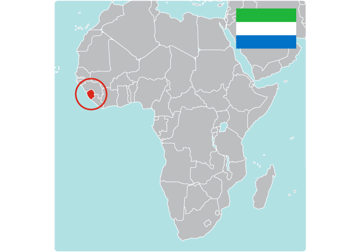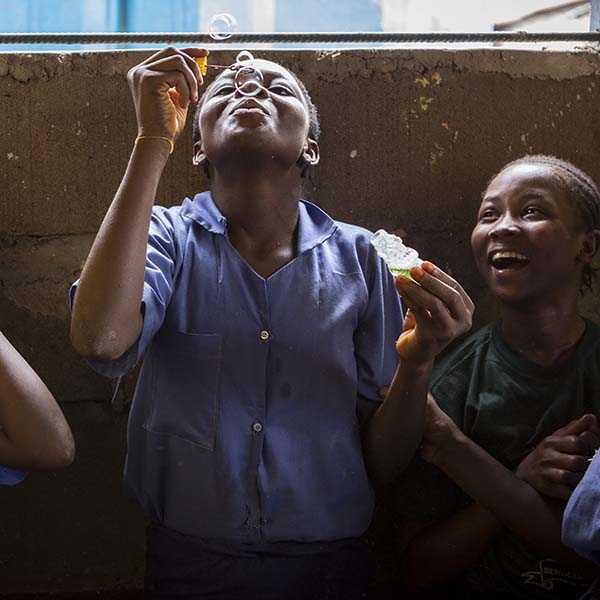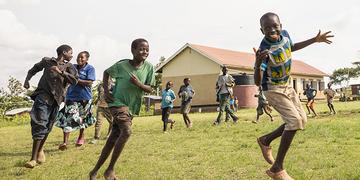Help Children in Sierra Leone
Sierra Leone is a poor country in western Africa. A former British colony, it is significant in the history of the transatlantic slave trade, serving as both a departure point for captive people and a home for repatriated former slaves in its capital of Freetown.
The country’s modern history has been overshadowed by a brutal civil war that ended in 2002, resulting in tens of thousands of deaths and the displacement of more than 2 million people – about one-third of the population. In 2014, Sierra Leone was one of the countries hardest hit by the deadly Ebola virus outbreak.
Today, Sierra Leone remains one of the world’s poorest countries, where nearly half of the working-age population engages in subsistence farming – and childhood is under threat.
Challenges for Children in Sierra Leone
Living in extreme poverty, with grave threats to their survival, health, education and protection, children in Sierra Leone need your help.
1 child in 10 dies before their 5th birthday, 15 times the U.S. rate
30% of children suffer from stunting due to malnutrition
30% of children are out of school, with 39% engaged in child labor, instead of learning
9% of women aged 20-24 are married/living with a partner before the age of 15, 30% before the age of 18, and 4% of 15-year-old, 11% of 16-year-old, and 15% of 17-year-old girls were pregnant/had given birth
7 children in every 1,000 are murdered
70% of people live in poverty

Our Results for Children in Sierra Leone

Masaray (center) and her schoolmates are enjoying their time together, thanks to your support of our psychosocial teacher training as part of our Ebola crisis response.
2,125,000 children healthy and nourished
251,000 children educated and empowered
47,000 children protected from harm
1,266,000 children aided in crisis
Our Work for Children in Sierra LeoneĚý
91˛Öżâ has been a leading charity for children in Sierra Leone since 1999, at the end of the Sierra Leone's civil conflict.Ěý Our work includes programs in health and nutrition, education, water and sanitation, child poverty and livelihoods, child protection, child rights advocacy, and emergency preparedness and response. Gender-sensitive approaches are built into all of our programming.
In 2014, we were one of the few global nonprofits to remain in the country during the height of the Ebola crisis, supporting infection prevention and control, providing supplies, training and treatment as well as contact tracing, public awareness-raising, community mobilization, child registration, and family tracing and reunification.
In addition, we provided support Ebola-affected families. We ensured unaccompanied children were returned to their families or an alternative caregiver and that orphaned children were provided care.
We have a long and successful history of working in partnership with established community structures, traditional and religious leaders, credible local and national organizations that are trusted and experienced in effectively engaging local populations, as well as children and families.
Here are some recent examples of our work:
A healthy start in life
- We’re focusing on the survival of children under age 5, with a special focus on newborns in the most vulnerable families and communities, including Ebola survivors and their families
- We work within communities through health workers and champions, at the district and national levels, to improve access to quality adolescent-friendly, gender transformative sexual, reproductive and child health services, and reduce adolescent pregnancy
The opportunity to learn
- By advocating for improved access to learning, we’re aiming to reach all girls and boys across Sierra Leone, not only through traditional and formal education but through creative learning environments and tools – with a focus on helping the most vulnerable (out of school children, children whose parents or caregivers have died, street children, child mothers, child-headed households and children from poor households in remote rural areas and urban slum communities) return to school, stay in school and learn
- Through our School Me project, we’re aiming to achieve gender equality in primary education by creating a protective, empowering environment for girls in their community, at home and in school
- Our sustainable Gal Pikin Buk Learning project helped leverage and extend School Me project interventions, ensuring that the transition girls make from primary school to junior secondary school was as successful as possible, by addressing the barriers that children – especially girls – encounter in continuing their education, particularly during this transition phase
Protection from harm
- We’re working with the “hidden children” in society, including those in kinship care or hard to reach communities and slums, out of school children, and those impacted by the Ebola crisis, helping protect them by strengthening community protection and safeguarding structures and linking these with more formal protection systems and services
- After advocating for many years against child marriage, 91˛Öżâ and partners achieved significant successes in 2017, including advances such as free quality education for excluded groups (especially girls) and Sierra Leone’s First Lady’s invitation to African leaders to join her “Hands Off Our Girls” campaign – resulting in a significant 23% reduction in child marriage since 2000
Emergency response
- We’re committed to continuing emergency response and support in preventing and maintaining the eradication Ebola in the region, including community surveillance support, disaster risk reduction and resilience building, particularly in children
- We responded to the devastating mudslides and torrential flooding that killed and forced children and families from their homes in 2017, providing emergency aid, support and counseling to those affected
How to Help Children in Sierra Leone
Support 91˛Öżâ’s mission. Donate to help children in Sierra Leone and around the world grow up healthy, educated and safe.
Join Team Tomorrow
Join Team Tomorrow and your monthly donation will go toward addressing the needs of children affected by today’s most urgent issues.Ěý
Sources: Facts and statistics have been sourced from 91˛Öżâ’s monitoring and evaluation experts, as well asĚýour thought leadership publications, including ourĚýGlobal Childhood Report 2020,Ěý Stop the War on Children 2020Ěýand ASRH in Sierra Leone Program Brief 2022Ěýreports.ĚýOther sources include ĚýĚýandĚý.
Ěý
Photo: J. Hyams / 91˛Öżâ.



